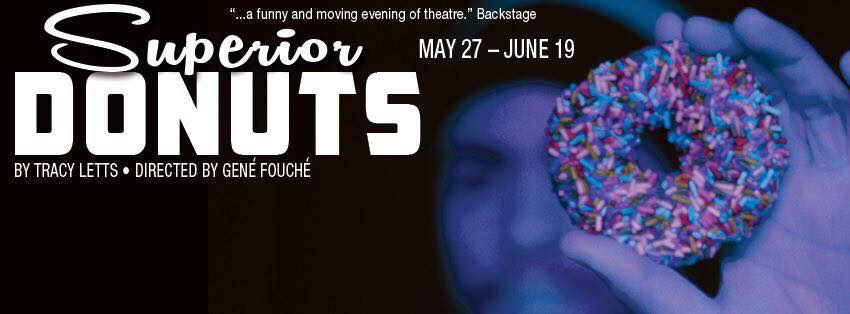Donut cannot change. Donut will always be donut. But the Maryland Ensemble Theatre can change up what’s on their mainstage menu as they close out the 2015/2016 season with Tracy Letts’ Superior Donuts. A shockingly different production from the original company-written rock musical seen just a month ago upon the boards, Superior Donuts, directed by company member Gené Fouché, is a stellar and touching dramedy that lives up to its titular adjectival description in talent, storytelling, and overall performance elements. Striking cords in the heart and the mind, this show turns fantasies into possibilities when it comes to actualizing the brilliance of Letts’ writing in this stage drama.
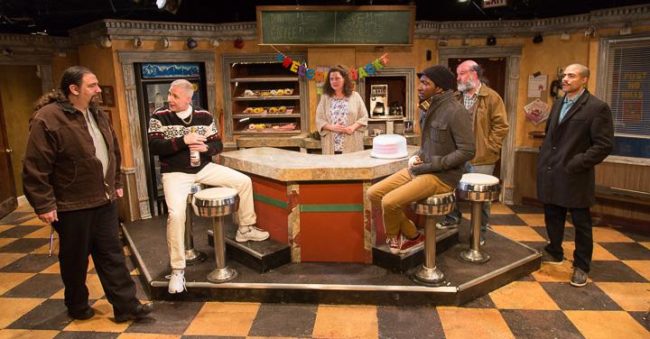
Chicago’s Uptown neighborhood is transported directly into Frederick, MD by way of Set Designer Ira Domser. Maintaining a broad sweep of authenticity inside the crumbling 60-year-old donut shop, Domser invites the audience into the dough of the setting, greased liberally with nuanced detail right down to the cracks of the stucco painted into the walls of the background. The shop possesses character; Domser’s design work effectively creates a donut shop that has seen decades of history lived inside its walls. Hanging the ceramic coffee cups beneath the top-molding of the shop across the length of the stage is just one of a half dozen personalized touches that gives the location a homey sense of existence.
Emotionally charging the monologue asides, Lighting Designer Chris Holland develops lighting cues that fit each of Arthur’s heart-spoken anecdotes like a delicately drizzle glaze over a steaming hot wad of fried dough. When he first speaks of Magda, there is a warm fuchsia glow that envelops the spotlight focused around him, a clear symbolic representation of love or something like it. When times grow sour between he and Magda, the embracing light is blue, transitioning the moment’s tone to sorrow and loss. These lighting cues are indicative of a strong understanding of Arthur’s journey in those moments. The ambient indoor lighting for the active scenes inside the donut shop feels well balanced and appropriate.
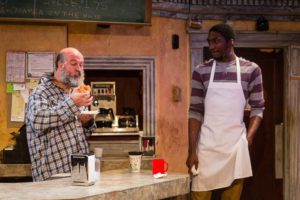
The characters in Tracy Letts’ script are penned with specificity. Allowing the actors to bring their own individuality to these characters, Costume Designer Cody Gilliam finds definitive pieces of their wardrobe to set the two constructs— of the actor and the character— on the path of perfect convergence. Gilliam treats Arthur’s stoner-stuck-in-the-past couture with recognizable tie-dye t-shirts, grungy jeans, and other “filthy hippy” accoutrements that feel most appropriate. The eclectic gathered-garb motif outfitted to Lady Boyle really accentuates her quirky street-savvy nature, as does Gilliam’s off-color sartorial selections of Max, the Russian next door.
While there are innumerable qualities of this production on which to rave over, one of the more outstanding elements is the impressive delivery of accents. Dialect Coach Kirsten Trump works tirelessly to ensure that those taking root in Chicago— like Arthur and Officer Randy— have a solid city sound. This is true of Luther and Kevin as well. Trump schools both Kiril and Max in the sounds of Russian immigrants and her work across the board is delivered with clear and concise consistency, making the performance exceptionally delightful upon the ear.
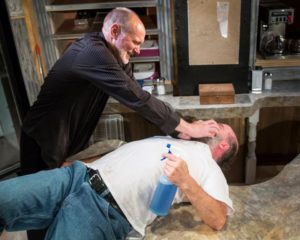
Visually stunning, the movement-based masterpiece of the performance comes from Fight Choreographer Mike Martin. The particularly brutal violence that erupts late in the second act is difficult to swallow as Martin effectively delivers a routine that screams authenticity. The fight carries on to a seemingly unending length, which ordinarily would not only gum up the pacing of the scene but result in a sloppy slide of moves, but with Martin’s brilliant fighting techniques in place, this is not the case in the least. The fight scene flows organically, never once faltering in its pacing. While the characters lose their energy— the fight is intensely involved and they are two old men going at it— the actors never do, ensuring that every punch, bite, throw-down, et al. is delivered with the same intensity, accuracy, and tenacity at the end of the fight as it is at the beginning. Jarringly barbarous, Martin’s fight scene is one of the most captivatingly authentic moments of physical exhaustion to be witnessed upon the MET stage in recent history.
Director Gené Fouché has delivered brilliance in her production. The show as a whole feels organic and tight, each moment clipping along from one to the next without dragging or racing through crucial moments of emotional development. Strong character relationships are explored and developed without sacrificing the natural humors that fall throughout the play. Fouché keeps the audience drawn into the work by letting these talented actors— a mix of MET’s seasoned company members and newcomers alike— take the reins of Letts’ work and go to town with it. Initial dialogue exchanges happen in real time with two sets of conversations occurring at once, Arthur’s asides feel as if he’s addressing an afterhours audience rather than reading a monologue; all of these components coming together to create a natural show to the point where the audience forgets they are watching a play. Earnestly approaching the story without artifice or device, Fouché allows the potent messages woven meticulously into the plot and dialogue to be heard and witnessed with ease and interest.
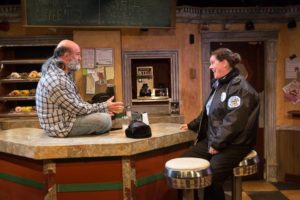
An ensemble piece to the core, minor characters like Kiril (Tom Majarov) and Kevin (Matt Lee) find their niche in the production with a simple gesture or speech pattern that identifies them. Majarov doesn’t appear until the very end of the production, but his simple spoken words make him feel as if he existed within the context of the play the entire time. Lee’s character is a smart-mouthed loose cannon with a temper that is barely kept in check just beneath the surface. It’s Lee’s accent that defines this character portrayal quite soundly.
Officer Randy Osteen (Laura Stark) and Officer James Bailey (Giovanni Kavota) fit the bill for the laidback lawmen when it comes to the Chicago PD. Convivial in their approaches to the character, both Kavota and Stark fit into the nest of characters crafted by Letts in this dramedy. Kavota’s character is delivered with heartwarming gentility but is not without a little spitfire, particularly when it comes to handling Max. The same can be said of Stark’s performance, as she’s mostly mellow until her over-reactive scene when she storms out of the donut shop with Kavota hot on her heels thinking it was something his character had said.
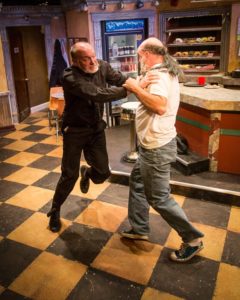
Tim Seltzer, as the sleazy smarmy Luther Flynn, creates a vile villain that we love to hate. Easing into the scene with that unsettling disquiet about his character, Seltzer portrays the epitome of the “compassionate mobster” with just a hint of the melodramatic flare these types are so often recognized for. Unctuous, but only just so, Seltzer finds a way to disturbingly disarm the confidence of both Franco and Arthur when encountering them. His physical fight work is astonishing and his stamina to go toe to toe with Arthur during the big battle is at the very least invigorating, if not entertaining, to watch.

Quite possibly running away and stealing the show with her authenticity, Julie Herber makes a focal point out of her character Lady Boyle. A mere tattered woman of the streets, Herber takes a simple background character and transforms it into a popping pistol with articulated gestures and a strong attention to quirky ticks. Stealing the scene with complete commitment to the character’s physicality and vocal delivery, when the topic of “Star Trek” and “aliens landing” have surfaced, the batteries come out, and hilarity ensues; all of this occurs inside a microscopic bubble of her own existence off in the corner of the donut shop. Herber’s portrayal of the alcoholic vagrant is multi-dimensional, drawing forth a wizened woman for whom time has not been kind in very cleverly crafted dialogue deliveries.
Masterfully handling the patois, rhythmic pause, and overall vocal affectation of the character of Max, Reiner Prochaska makes the Russian heavyweight from the DVD shop next door a true contender for intriguing character. With vivid facial expressions and an almost spastic way of explaining himself in various situations, Prochaska is an invigorating infusion of live wires and sparky commentary that fits right into the mishmash of characters gathering at the donut shop throughout the course of the play. Playing the character’s humors with a severely straight approach, Prochaska unearths a raw humor in the character that could easily be written away in over-caricaturizing Max.
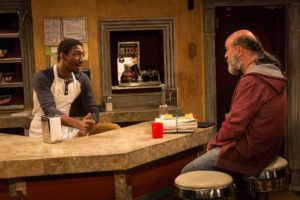
Franco Wicks (Najee Banks) can’t stop moving. This is only a problem when he encounters the stoned wall that is Arthur Przybyszewski (Tad Janes.) The unstoppable force meets the immovable wall, so to speak, and the combustive results that ignite between Banks and Janes is sheer theatrical brilliance. Banks is possessed of an upbeat attitude and energy that rolls through his enormously tall and lanky figure. Janes possesses the exact opposite notions of sluggish and pessimistic outlooks which situate easily into his shorter stockier build. The pair go toe to toe throughout the performance in great moments of tension, both laughable and serious. The emotional bond that forms, though precariously, between the two, exemplifies the natural relationship that Letts intended for the two characters.
Banks is bubbly, to put it plainly. Playing the character mostly on the positive side of things, it is impressive to see the depths to which he is able to plunge when situations sour. There is a contagious giddiness present in Banks’ portrayal of Franco, particularly when he gets excited over his novel. Blasting an enthusiastic radiance that could easily rival the sun, Banks all but bounces out of his skin in the idle of the second act when Arthur gets to praising his character’s book. Physically aware of himself in the grander scheme of spatial relations, Banks delivers everything from simple stage crosses to his infectious laughter for the purist and most focused of intentions.

Janes was designed for the role of Arthur or perhaps vice versa. Situating comfortably into the out-of-focus aloof stoner character, Janes channels the humors often associated with a draft-evading stoner of that era directly to the audience’s attentions. Hilariously engaged in being “un-present” in the opening scene, Janes showcases his extreme versatility as a performer during his asides to the audience. Toeing the line of emotional imbalance in these moments, Janes delivers heartfelt after heartfelt monologue that tugs at the audience’s emotional sensibilities. Gripping, mindful, and overall amazing, Janes puts the superior in Superior Donuts.
It ain’t horse fat, we’ll give you that! It’s fantastic. It’s dramedy at its finest. It moves with grace and elegance, humor, and emotions, all packaged up perfectly for an evening of exceptional entertainment the likes of which you won’t find just anywhere. Superior Donuts is the ticket for this spring, be sure to get yours before the close up shop in mid-June.
Running Time: Approximately 2 hours and 40 minutes with one intermission
Superior Donuts plays through June 19, 2016 on the Main Stage of the Maryland Ensemble Theatre in the Historic FSK Hotel building— 31 W. Patrick street in downtown historic Frederick, MD. For tickets call the box office at (301) 694-4744 or purchase them online.

